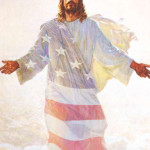We run our website the way we wished the whole internet worked: we provide high quality original content with no ads. We are funded solely by your direct support. Please consider supporting this project.

Making America an Idol
I write as a kingdom person in the context of America, presently the dominant empire in the world. In that light, I’d like to address the fact that my calling is to resist nationalism even in the midst of appreciating my own country.
America was conquered by white Europeans in the name of nationalistic religion. Almost all nations throughout history have gone to battle and conquered under the banner of some god or another. “For God and country” is hardly a new military slogan! The European conquest of America differed only in the fact that its tribal god wasn’t Zeus, Apollo or Allah. It was Jesus. In the name of the crucified messiah, white Europeans claimed this land, slaughtered millions of Native Americans, enslaved millions of Africans, and eventually came to rule.
Not only this, but following the tradition of Eusebius and Augustine (as well as pagans throughout history), the success Europeans enjoyed in vanquishing their enemies was viewed as proof that God was on their side. It was “Manifest Destiny” that white Europeans were to lord over the land and over non-Europeans.
This Christendom mindset has pervaded American culture and religion from the start. Throughout our history, and yet today, Americans have tended to see their nation as a “Christian” nation. We have tended to view ourselves as uniquely “under God,” uniquely righteous, and uniquely destined by God to be a “light to the world.” We tend to believe that American soldiers fight “for God and country,” for we are just and righteous while our enemies are “evil-doers.”
Now, there’s absolutely no evidence that God himself agrees with any of this—unless, of course, you buy into the old pagan argument that military power is itself proof of divine favor. The myth of America’s favored status is simply something we’ve told ourselves for centuries to buttress our tribal self-identity, shore up our collective tribal allegiance, motivate our tribal warriors, and express our tribal religion. The myth, in other words, is just our particular version of nationalistic idolatry.
This isn’t to deny in any way that America has done, and continues to do, a lot of good around the world. But as people who are called to keep God’s kingdom holy, we must all take great care not to confuse whatever good we think our nation does with the kingdom of God. While some nations are better in some respects than other nations, no nation is more aligned with the kingdom of God than any other. For, as Jesus reminds us, the kingdom is “not of this world” (John 18:36).
—Adapted from The Myth of a Christian Religion, pages 83-84
Photo credit: Oky – Space Ranger via Visualhunt.com / CC BY-NC-ND
Category: General
Tags: America, Kingdom of God, National Idolatry, Nationalism
Related Reading

Is America Uniquely “Under God”?
As a rallying slogan for our civil religion, the proclamation that we are “one nation under God” arguably serves a useful social function, for it gives many Americans a sense of shared values and vision. But it is not a slogan kingdom people in America should take too seriously. We must always remember that, while…

How God Changes the World
All who place their trust in Jesus look forward to a day when he will return and fully establish the kingdom of God. When this happens, Scripture promises that everything will change. There will be no more sickness, death, hunger, natural disasters, violence, fear, heartaches, sin, or evil. There will be no more racism, nationalism,…

Is America God’s Favored Nation?
Bart via Compfight Is money a sign of God’s blessing? If so then the more you have the more blessed of God you are. If a church has more money, then more of God’s favor is on it. If a country is wealthy, then we can claim God’s favored status. But is this the way…

You’re Not a Pacifist Are You?
Jayel Aheram via Compfight Brian Zahnd wrote a great piece the other day on this topic. He contends that when he is asked this question, it often has the same flavor of the question, “You’re not a pornographer are you?” Why is this question so contentious among believers? Brian has some interesting ideas about it.…

Lighten Up: America is NOT the Kingdom of God
For some thoughts from Greg on the 4th of July and the Kingdom of God, see The Birth of Two Kingdoms: A Fourth of July Reflection. And now for one of the most ridiculous examples of confusing the Kingdom of God with America. This would be…

Podcast: How Should Pacifists View Military Veterans?
Greg dons camouflage in this boots to the ground episode. http://traffic.libsyn.com/askgregboyd/Episode_0295.mp3
